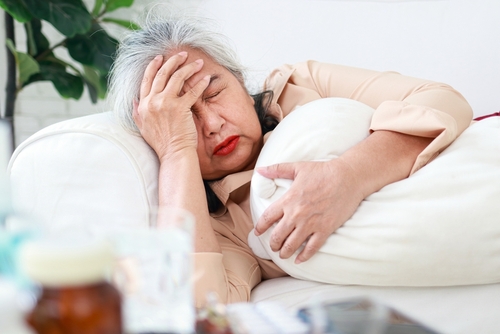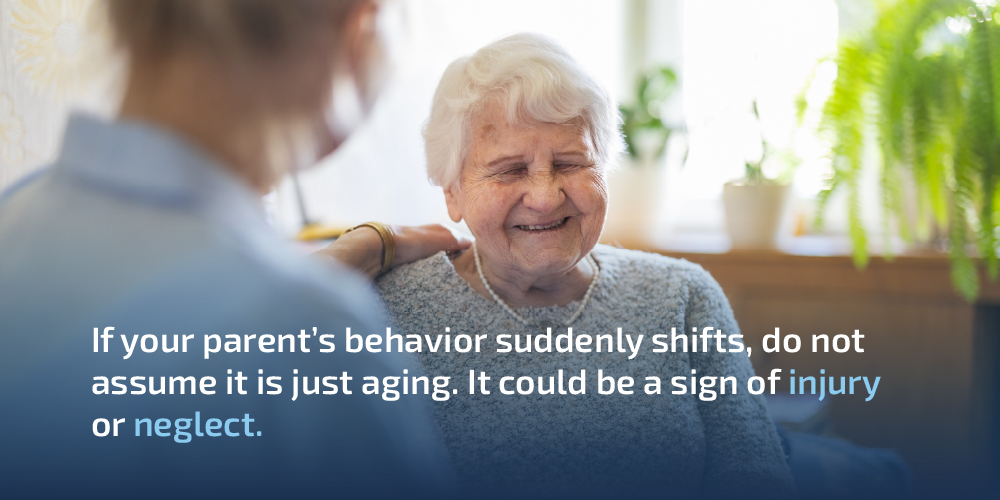
When you visit your parent in a nursing home, you expect to see the familiar face and personality you love. But what happens when something feels off? Maybe your mom does not recognize you right away, or your dad seems confused about what day it is. These changes might feel like normal aging, but they could signal something more serious: a traumatic brain injury.
Falls and abuse in nursing homes happen more often than most families realize. When these incidents involve head trauma, the effects can be subtle at first but tragic if left unaddressed. Our Peoria nursing home injury lawyers are here to help you understand what to look for and how to respond. This can make all the difference in protecting your loved one and ensuring they get the care they deserve.
What Are the Warning Signs of a Traumatic Brain Injury in an Older Person?
Traumatic brain injuries, or TBIs, do not always announce themselves with obvious symptoms. Unlike a broken bone or a bleeding cut, brain injuries hide beneath the surface. This makes them especially dangerous for older adults in nursing homes, where staff might mistake serious symptoms for typical aging or dementia.
Physical signs often appear first. You might notice unexplained bruising on your parent’s head or face. They might complain of persistent headaches that do not go away with medication. Dizziness, nausea, or vomiting can also point to head trauma. Some people experience vision problems, seeing double or having trouble focusing their eyes. Others develop sensitivity to light or sound that was not there before.
How Can a Brain Injury Change Someone’s Behavior?
Cognitive changes deserve immediate attention. If your parent suddenly cannot remember recent conversations or seems more confused than usual, take it seriously. They might struggle to find the right words or lose their train of thought mid-sentence. Some people with TBIs repeat the same questions over and over, seemingly unable to hold on to new information.
Decision-making becomes harder, and they might make choices that seem completely out of character. A parent who was always careful with money might suddenly give away cash to strangers. Someone who usually loves their daily routine might become disoriented about basic schedules.
Can a Head Injury Cause Mood Changes in Older Adults?
Emotional and behavioral shifts can be just as telling as physical symptoms. A typically calm parent might become agitated or aggressive without a clear reason. Depression and anxiety often spike after brain injuries. Some residents withdraw socially, no longer wanting to participate in activities they once enjoyed.
Mood swings that seem to come out of nowhere warrant investigation. Your parent might cry easily or get angry over small things that never bothered them before. Sleep patterns frequently change too, with some people sleeping far more than normal while others develop insomnia.
The tricky part is that many of these symptoms overlap with other conditions common in older adults. This is why documentation matters so much. Keep a detailed record of what you observe and when. Take photos of any visible injuries. Write down specific examples of behavioral changes with dates and times.
Can a Resident’s Fall in a Nursing Home Cause Brain Injuries?
Falls are the leading cause of TBIs in nursing home settings. These are not simple trips that anyone might experience. They often result from preventable conditions that nursing homes have a legal duty to address under the Illinois Nursing Home Care Act.
Wet floors without warning signs create hazards. Poor lighting in hallways and bathrooms makes it hard for residents to see where they are going, especially when they cannot see very well to begin with. Broken or missing handrails remove crucial support. When staff members fail to respond quickly to call buttons, residents might try to get up on their own and lose their balance.
Medication errors contribute to falls more than most people realize. Some drugs cause dizziness or drowsiness. When medications are not properly managed or when residents take the wrong doses, their fall risk skyrockets. Understaffing means fewer eyes watching for these dangers and fewer hands available to help residents move safely.
Can Nursing Home Abuse or Neglect Lead to Head Trauma?
Physical abuse, while harder to think about, causes a significant number of head injuries in nursing facilities. This abuse might come from staff members or from other residents. An aggressive push, a violent shove, or being dropped during transfers can all cause brain trauma.
Rough handling during bathing or dressing might slam a resident’s head against hard surfaces. Sometimes abuse happens when staff members become frustrated or angry. Other times, residents with dementia might strike out at roommates or neighbors, and inadequate supervision allows these incidents to occur.
Likewise, neglect creates conditions where injuries become inevitable. When staff ignore a resident’s needs, that person might fall trying to reach the bathroom alone. Dehydration and malnutrition, both signs of neglect, increase confusion and weakness, making falls more likely.
Pressure sores indicate that someone is not being moved or cared for properly. Bedridden residents who are neglected can still suffer head injuries from improper handling or being dropped during the rare times they are moved. The common thread in all these scenarios is that they are preventable with proper care and attention.

When Should You Contact a Lawyer About a Nursing Home Injury?
Not every injury requires legal action, but certain situations definitely warrant consulting with an attorney. If your parent’s brain injury resulted from clear negligence, abuse, or a pattern of safety violations, you may have grounds for a claim. When nursing homes fail to meet their duty of care, they should be held accountable.
A lawyer can investigate what happened, gather evidence, and determine whether the facility violated regulations or standards of care. They can also help you understand your options, which might include:
- Filing a complaint with state regulators
- Pursuing compensation for medical expenses and suffering
- Moving your parent to a safer nursing home
- Ensuring the nursing home makes changes to protect other residents
Legal action is not just about your family. It can force nursing homes to improve their practices and prevent similar injuries from happening to others. Many facilities only make meaningful changes when they face real consequences for their failures.
Call a Peoria County, IL Nursing Home Injury Attorney Today
Contact Nursing Home Injury Center at 309-524-6900 for a free consultation about your case. As part of a large firm with substantial resources and experience, our clients receive outstanding customer service and access to a wealth of helpful information throughout the legal process. When your parent depends on others for care and that trust is broken, a Peoria, IL nursing home injury lawyer can help you seek justice.



